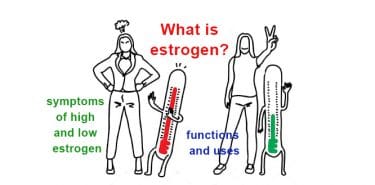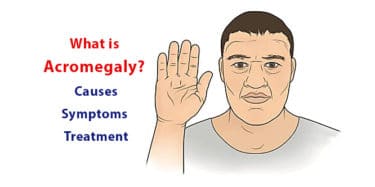Melatonin is one of the main hormones that control body functions. It is also known as a sleep hormone. Its release increases in darkness, which allows to fall asleep. It can cause problems such as insomnia when it is secreted slightly. Melatonin supplements are prescribed in cases of extreme insomnia, tinnitus and Alzheimer’s disease. These supplements produced and sold in pill form have no known serious side effects. Since it has antioxidant properties, it is used as an anti-aging supplement.
Table of Contents
What is Melatonin?
Melatonin is secreted by the brain and controls the body’s daily rhythm. It is also known as sleep hormone. The production of melatonin secreted by the pineal gland in the brain is linked to the time of day. Its production increases in the dark and decreases in the light.
In addition, its pills that can be taken as supplements are used in many medical conditions such as Alzheimer’s disease, radiation exposure and tinnitus. (1)
What does melatonin do to your body?
This hormone is like the body’s clock, a hormone that tells the body when to fall asleep, when to wake up or eat. It also helps regulate body temperature, hormone levels and blood pressure. People suffering from insomnia or sleep imbalance due to jet-lag boost the hormone level by taking the supplements.
Mostly made from cow’s pineal gland, these pills have very few side effects and have many benefits. They are used as an antioxidant, have anti-aging properties, and they help establish the day and night cycles of blind people.
Is taking melatonin good for insomnia?
Less secretion of this hormone, which regulates the body’s sleep cycle, causes sleep disorders. Studies have shown that taking melatonin supplements is beneficial for sleep disorder in cases where the body’s biological clock is deteriorated when the person’s sleep-wake cycle is delayed by 3-6 hours.
How is melatonin secreted?
Melatonin secreted by the pineal gland works in conjunction with the light perception of the retinal layer in eye. Cells that detect light in eye signal the state of light to hypothalamus region in brain. These signals are then sent to pineal gland, and hormones are secreted.
In the dark, the secretion of this hormone increases, and at the same time, some changes that promote sleep, such as decreasing body temperature and decreasing respiratory rate, occur. Melatonin levels are low during the day.
Benefits of melatonin
Apart from sleep disturbance problems, melatonin is also used in different areas:
- It is used as an antioxidant.
- It is known to have an effect that strengthens the immune system and reduces inflammation, but studies are ongoing on how the process works. (2)
- With its antioxidant properties, it prevents damage to cells and protects eye health.
- It regulates fat cells.
- It has a protective role in neurological degeneration disease and acute pancreatitis.

Causes of melatonin deficiency
Under-secretion of the melatonin hormone leads to deficiency. This condition is known to affect many conditions, from sleep disturbance to psychological disorders, such as:
- Insomnia: Lack of sleep
- Jet lag: Insomnia due to time difference in flights between countries
- Delayed sleep phase syndrome: The body’s daily cycle is too long
- Sleep disturbances in people working day and night shifts are known to be caused by a deficiency of melatonin.
In addition, melatonin was observed as lower than normal in children with autism.
Symptoms of melatonin deficiency
- Sleeping disorders
- Being constantly depressed and feeling anxious
- Fatigue and weakness
- Heart palpitations
- Sexual reluctance or sexual dysfunction
Melatonin deficiency treatment
When melatonin is not secreted enough, sleep disorders occur. The solution is to take supplements. These supplements are effective in improving sleep rhythms and are used as preventive and supportive in other disorders.
Melatonin pills are preferred more because they have less side effects than sleeping pills. Nevertheless, a doctor should be consulted before use, and any other underlying cause of insomnia should be investigated. (3)
Melatonin hormone is released at most between 23.00 and 5.00 at night and requires a dark environment for its secretion. Sleeping too late and getting up late can also cause sleep disorders. Therefore, taking care to sleep especially during these hours and not sleeping in the day light environment can prevent melatonin deficiency. In order to avoid this problem in children, care should be taken to establish a sleep pattern.
Melatonin and depression
Failure to sleep adequately and quality sleep can lead to consequences such as fatigue, weakness and depression. Melatonin pills are used to regulate the body’s daily rhythm in people experiencing these symptoms.
However, in recent years, some studies have raised the question of whether these pills cause depression. A study published in 2016 showed that there were no serious adverse effects associated with the use of melatonin.
Melatonin medications
Melatonin is a dietary supplement used worldwide. Although it is used to regulate sleep disorders, it has a strong effect on different health problems. Although the drugs are safe for short-term use, there is not enough evidence for its long-term use.
What is melatonin used for?
In addition to eliminating sleep disorders, drugs play a role in immune system functions, regulating blood pressure and managing the body’s cortisol level. It is used as a powerful antioxidant in the treatment of different diseases.
Research shows that melatonin is effective in improving eye health, reducing the symptoms of seasonal depression, and relieving stomach problems such as reflux.
What is melatonin pills, what is it used for?
Melatonin is an artificially produced form of melatonin, which is naturally present in the body. It is used as a supportive treatment in many health problems.
For sleep problems
The melatonin pill, which is often used to treat sleep-related problems, helps people fall asleep faster and improve sleep quality. Studies have shown that melatonin reduces falling-asleep time, increases total sleep time and sleep quality. Besides, it has less side effects compared to other sleeping medications.(4)
In the treatment of seasonal depression
Emotional disorder, known as seasonal depression or winter depression, usually occurs at the beginning of winter or in late autumn, and is known to affect 10% of the population worldwide. Some studies have shown that it is originated by seasonal light changes, light changes affect our circadian rhythm, and depression may be related to it.
Since melatonin is effective in regulating circadian rhythm, low doses are used to reduce the symptoms of seasonal depression. However, it was not effective in reducing symptoms of bipolar disorder and depression. Further research is needed. (5)
What is Circadian rhythm?
Circadian rhythm is physical, mental, and behavioral changes that follow a daily cycle. It acts primarily by reacting to light and darkness. Sleeping at night and being awake during the day is an example of the circadian rhythm of light. Circadian rhythm is found in most living things, including animals, plants and many small microbes.
In the treatment of cancer
Melatonin can be used both in the prevention of cancer and as an additional treatment in cancer. Many studies have shown that melatonin inhibits the growth of breast cancer cells, cervical cancer cells, and ovarian cancer cells. (6)
It strengthens immunity
A number of experimental studies show that there is a close connection between melatonin and the immune system, and that melatonin has an immune-enhancing effect. Melatonin can be used to stimulate the immune response during viral – bacterial infections, and may enhance immune reaction.
It promotes growth and cellular regeneration
Growth hormone, which is vital for growth and cellular regeneration, is linked to the increase in muscle mass and strength. Some research has shown that melatonin supplementation increases this hormone level in men, but further studies are needed to see how it affects hormone levels in both women and men.
For eye diseases
Melatonin is effective in keeping eyes healthy with its antioxidants and anti-cell damage properties. It has been shown to be effective in the treatment of eye diseases such as glaucoma and age-related degeneration.
For stomach disorders
Melatonin, which is observed to inhibit the secretion of gastric acids, has been effective in relieving stomach discomfort when taken with other stomach medications.
For Alzheimer’s
Several studies on Alzheimer’s and similar neurological disorders have shown that melatonin’s property of cell damage prevention may be effective in the treatment of these diseases.(7)
For heart diseases
There is evidence that these supplements can be used as preventive and supportive in heart diseases.
For tinnitus
It has been observed that tinnitus decreases and sleep quality increases when people use the supplements regularly.
For headache
When used for headaches, positive results have been observed especially in regional headaches such as migraine.
Side effects of melatonin pills
Studies on the side effects of the pills did not reveal any serious side effects and no signs of addiction or withdrawal. Supplements are considered safe in the short term, even if taken at very high doses. Further research is needed about its safety in the long term.(8)
Common side effects reported:
- Headache
- Dizziness
- Nausea
- Sleepiness
Less common side effects:
- Short-term depression
- Mild anxiety
- Stomach cramps
- Slight tremor
- Irritability
- Confusion and loss of orientation
- Low blood pressure
Since it will cause sleep or drowsiness, any machine should not to be used for 5 hours after the supplement is taken, even the supplement should be taken at an hour close to sleep time.
Who should not use melatonin?
- People with a disease affecting the immune system
- People using blood thinners
- Diabetes patients
- People with a risk of stroke
- Those with bleeding disorders such as hemophilia
- Depression patients.
When drugs which have a side effect as drowsiness is taken with melatonin, drowsiness may increase.
What is melatonin band and what is it used for?
It is used for melatonin deficiency, is a product that is attached to the skin to meet the daily needs of the person and is effective for 24 hours. It is used for same purpose as the pill.
Is melatonin drugs safe to use?
No serious side effects have been observed in the supplements. Although it seems safe in many ways in the short-term use, further research is needed for its long-term use. Therefore, children, pregnant and breastfeeding women, known as risk groups, should consult a doctor before use.
What is the safe dose of melatonin?
The ideal dosage for melatonin varies from person to person. Various factors, such as body weight, metabolism, and general health, can also affect how the body responds to melatonin. Recommended daily dose is 0.2 mg to 5 mg for adults. It is recommended to take this dose 1 hour before bedtime.
First, it should be started with a low dose, if no side effects are seen, the dose should be increased gradually. Unless a doctor recommends a higher dose, you should not take more than 5 mg.
Antidepressants containing melatonin
- Melatonina tablet
- Valdox
Foods that increase the hormone melatonin
- Cranberry, sour cherry, banana, blackberry, strawberry, apple, orange,
- Fennel, camomile, thistles, anise,
- Walnut, hazelnut, peanut, chestnut, almond, sunflower, sesame, fenugreek, flax seed
- Oats,
- Cucumber, zucchini, eggplant, tomatoes,
- Onions, potatoes, spinach, peas,
- Cauliflower, broccoli, cabbage,
- Kidney beans, beans, chickpeas, mushrooms.




